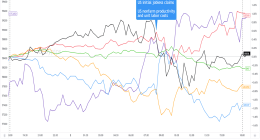
I am in receipt of my state pension of £180.97 per week. I checked my National Insurance records and I have 37 years of full contributions and seven years with no full contributions between 1977 and 1984.
I had my children in 1976 and 1979 and went back to work in 1984 when my youngest reached five years old.
Should I receive a higher pension as I was caring for my children during the seven-year discrepancy period?
SCROLL DOWN TO FIND OUT HOW TO ASK STEVE YOUR PENSION QUESTION

Record check: I claimed child benefit in the 1970s and 1980s and think I lost out on state pension
Steve Webb replies: As you may be aware, the Government has recently admitted that over 200,000 people – mostly mothers – have been underpaid state pensions to the tune of £1billion because of errors in recording time at home with children on National Insurance records.
The problem seems to have arisen where people claimed child benefit before May 2000 and did not put an NI number on the claim form, because until then you were not required to provide it.
In this column I’ll explain how you can check if you are one of those people, and what to do if you are.
To recap briefly on the issue, back in the 1970s the government of the day decided it would be right to take account of time bringing up children when working out state pensions.
The new scheme was only introduced in 1978/79, so any year before 1978/79 when someone was not working because of family responsibilities would not count.
When the system was first introduced it was known as ‘Home Responsibilities Protection’ or HRP.
Each year from 1978/79 onwards when you were getting child benefit for a child under 16 would count as a year of HRP, subject to three main conditions:
– The child had to be under 16 for the full financial year; so the year in which your youngest child turned 16 would not count;
– The child benefit had to be in your name (though in some cases the HRP can be transferred to you after the event, provided you reached pension age after 5 April 2008); AND
– You were not eligible if you were paying (or able to pay) National Insurance at the reduced ‘married woman’s rate’ for the year in question;
In your case therefore, it sounds as though you might be entitled to HRP for 1978/79 to 1983/84 inclusive.
The way HRP was factored into your pension calculation was slightly odd. Rather than count in full as a year towards your pension, HRP years were instead *deducted* from your target 39 years for a full pension.
To give a simple example, suppose that you had 19 years of full contributions and 5 years of HRP.
You might imagine that they would add the 19 to the 5 to get 24 years towards a target of 39 years – a contribution record of 62 per cent.
But instead, they said you have 19 full years towards a (reduced) target of 34 years, a contribution record of 56 per cent.
As you can see, this means an HRP year isn’t quite as good as a full year of contributions.
One consequence of this way of applying HRP is that for those who reached pension age prior to 6 April 2010, your HRP *will not show* on your NI record as a full qualifying year.
In this situation you can only find out if there is HRP on your record by ringing the National Insurance helpline on 0800 200 3500.
On 6 April 2010 the system changed in a way that makes years of HRP much more valuable. For those reaching pension age after that date, any years of HRP on your record were converted into full qualifying years towards your state pension.
This means that, for people who reached pension age after 5 April 2010, HRP years *should show* as full qualifying years on your online NI record.
If they are missing then it is very likely that there is an error. The other change in 2010 is that NI credits for time at home with children now only apply when the child is aged under 12 rather than under 16 as previously.
In your particular case, you have told me that you were born in 1949 and therefore reached pension age in 2009. Based on my explanation above we would not expect HRP to be showing on your record because you reached pension age before 2010 – though you could ring up to check it’s there.
If HRP is missing, your pension would only go up if your ‘basic’ state pension is less than the current figure of £156.20.
If your total figure already includes a full basic pension then *even if* there is an error on your HRP it wouldn’t change your pension because you are already getting the maximum amount.
Where there are errors on people’s NI records because of missing HRP, HMRC are planning an extensive programme of writing to people who *may* be at risk of missing out, but the truth is that they don’t actually know for sure.
This is because records of who was on child benefit back in the 1980s and 1990s have all been destroyed by now.
Whilst they clearly don’t want people making speculative inquiries, where someone has checked as explained above and is clearly missing HRP then it seems to me they should not have to wait and should claim their HRP.
This can be done by filling in the Home Responsibilities Protection form.
Based on the feedback we are getting so far, it is clear that it is taking HMRC a long time to process HRP claims, and longer still before DWP update people’s pension entitlement, but it is worth getting in the system now if you are sure you are missing out.










